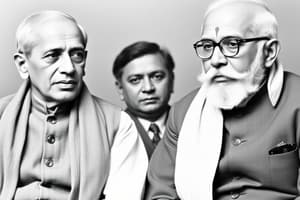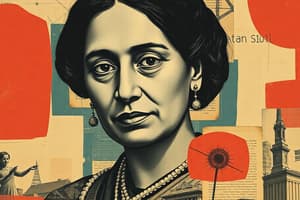Podcast
Questions and Answers
Where was Dadabhai Naoroji born?
Where was Dadabhai Naoroji born?
- Delhi, India
- Mumbai, India
- Navsari, Gujarat, India (correct)
- Bombay, India
What was Dadabhai Naoroji's profession in 1854?
What was Dadabhai Naoroji's profession in 1854?
- Founder of the Oriental Bank Corporation
- Professor of mathematics and natural philosophy (correct)
- Member of the British Parliament
- Member of the Indian National Congress
What year did Dadabhai Naoroji publish his work 'Poverty and Un-British Rule in India'?
What year did Dadabhai Naoroji publish his work 'Poverty and Un-British Rule in India'?
- 1892
- 1876 (correct)
- 1875
- 1885
What was Dadabhai Naoroji's role in the Indian National Congress?
What was Dadabhai Naoroji's role in the Indian National Congress?
What was Dadabhai Naoroji's political affiliation in the British Parliament?
What was Dadabhai Naoroji's political affiliation in the British Parliament?
What did Dadabhai Naoroji advocate for?
What did Dadabhai Naoroji advocate for?
Who referred to Dadabhai Naoroji as the 'Grand Old Man of India'?
Who referred to Dadabhai Naoroji as the 'Grand Old Man of India'?
When did Dadabhai Naoroji pass away?
When did Dadabhai Naoroji pass away?
Flashcards are hidden until you start studying
Study Notes
Early Life and Education
- Dadabhai Naoroji was born on September 4, 1825, in Navsari, Gujarat, India
- He came from a Parsi family and was the son of Maneckbai and Naoroji Palanji Dordi
- Naoroji was educated at the Elphinstone College in Bombay (now Mumbai)
Career
- Naoroji became the first Indian to hold a prominent position in the British government when he was appointed as a professor of mathematics and natural philosophy at the Elphinstone College in 1854
- In 1855, he founded the first Indian-owned bank, the Oriental Bank Corporation
- Naoroji was a strong advocate for Indian rights and liberties, and he played a key role in the formation of the Indian National Congress in 1885
- He was elected as a Member of Parliament for the Liberal Party in 1892, becoming the first Asian to occupy a seat in the British Parliament
Contributions and Achievements
- Naoroji's work, "Poverty and Un-British Rule in India", published in 1876, exposed the economic exploitation of India by the British and highlighted the need for Indian self-governance
- He was a pioneer in the Indian independence movement and was one of the first to advocate for Swaraj (self-rule) for India
- Naoroji's efforts led to the establishment of the Indian National Congress, which became a platform for Indian nationalists to voice their demands for independence
Later Life and Legacy
- Naoroji continued to work towards Indian independence until his death on June 30, 1917
- He was a mentor to many Indian nationalists, including Mahatma Gandhi, who often referred to Naoroji as the "Grand Old Man of India"
- Naoroji's contributions to the Indian independence movement and his advocacy for Indian rights and liberties have made him a legendary figure in Indian history
Early Life and Education
- Dadabhai Naoroji was born on September 4, 1825, in Navsari, Gujarat, India
- He came from a Parsi family and was the son of Maneckbai and Naoroji Palanji Dordi
- Naoroji was educated at the Elphinstone College in Bombay (now Mumbai)
Career
- In 1854, Naoroji became the first Indian to hold a prominent position in the British government as a professor of mathematics and natural philosophy at the Elphinstone College
- He founded the Oriental Bank Corporation in 1855, the first Indian-owned bank
- Naoroji played a key role in the formation of the Indian National Congress in 1885, advocating for Indian rights and liberties
- In 1892, he became the first Asian to occupy a seat in the British Parliament as a Member of Parliament for the Liberal Party
Contributions and Achievements
- Naoroji's book "Poverty and Un-British Rule in India" (1876) exposed the economic exploitation of India by the British and highlighted the need for Indian self-governance
- He was a pioneer in the Indian independence movement, advocating for Swaraj (self-rule) for India
- Naoroji's efforts led to the establishment of the Indian National Congress, a platform for Indian nationalists to voice their demands for independence
Later Life and Legacy
- Naoroji continued to work towards Indian independence until his death on June 30, 1917
- He was a mentor to many Indian nationalists, including Mahatma Gandhi, who referred to him as the "Grand Old Man of India"
- Naoroji's contributions to the Indian independence movement and his advocacy for Indian rights and liberties have made him a legendary figure in Indian history
Studying That Suits You
Use AI to generate personalized quizzes and flashcards to suit your learning preferences.




